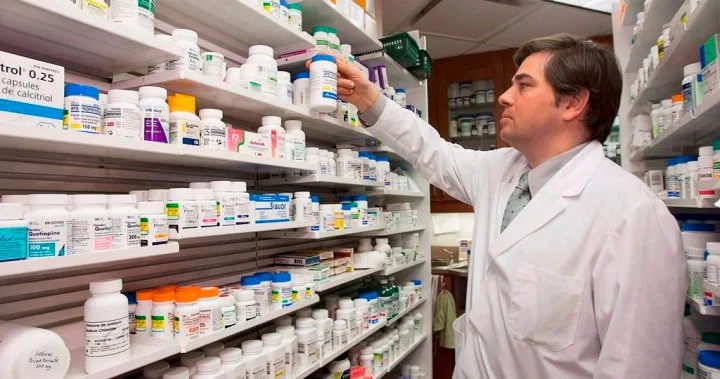In the UK, chemists, also known as pharmacists, don’t typically prescribe medications like doctors do. However, they can offer advice on over-the-counter medications and provide certain prescription medications under specific circumstances through mechanisms like Patient Group Directions (PGDs) or independent prescribing, but this is typically in collaboration with a doctor or other healthcare professional.
How do Chemists Support UK Healthcare?

Chemists in the UK healthcare system fulfill diverse roles beyond simply dispensing medications, including providing valuable healthcare advice and collaborating with other professionals to promote patient health and well-being.
Dispensing Medications
Chemists play a vital role in dispensing medications to patients based on prescriptions provided by doctors or other healthcare professionals.
They ensure accuracy in dispensing the correct medication, dosage, and instructions for use.
Chemists also provide counseling to patients on how to take their medications properly, including potential side effects and interactions with other drugs.
Additionally, they may offer advice on proper storage and disposal of medications to ensure optimal effectiveness and safety.
Providing Healthcare Advice
Chemists serve as accessible healthcare resources for patients seeking advice on a wide range of health-related issues.
They offer guidance on managing minor ailments and common health concerns, such as colds, allergies, and digestive issues.
Chemists provide information on over-the-counter medications, including their uses, dosages, and potential side effects.
Patients often consult chemists for advice on maintaining overall health and wellness, including recommendations for vitamins, supplements, and lifestyle modifications.
Collaborating with Doctors and Other Healthcare Professionals
Chemists collaborate closely with doctors and other healthcare professionals to ensure coordinated patient care.
They communicate with prescribing physicians to clarify medication orders, address any concerns, and provide feedback on patient responses to treatments.
Chemists may participate in multidisciplinary healthcare teams, contributing their expertise in medication management and patient counseling.
In cases where patients require specialized care or additional medical attention, chemists facilitate referrals to appropriate healthcare providers while continuing to support the patient’s medication needs.
What are Chemists’ Prescription Authorities in the UK?

While chemists in the UK have some prescription authority through mechanisms like PGDs and independent prescribing, their role in medication management is characterized by collaboration with doctors and other healthcare professionals to ensure the safe and effective use of medications for patients.
Limitations on Prescription Authority:
While chemists (pharmacists) in the UK play an essential role in medication management, their prescription authority is limited compared to doctors.
Chemists cannot independently prescribe all medications; instead, their prescription authority is regulated and restricted to specific circumstances.
The limitations on prescription authority are in place to ensure patient safety, as prescribing medications requires a comprehensive understanding of pharmacology, medical conditions, and potential interactions.
Patient Group Directions (PGDs)
- PGDs are written instructions that allow specified groups of patients to receive specified medications from a pharmacist without a prescription from a doctor.
- PGDs are typically used in situations where there is a need for timely access to medication for a specific group of patients, such as during public health emergencies or vaccination campaigns.
- Pharmacists must undergo training and adhere to strict guidelines when operating under a PGD to ensure the safe and appropriate use of medications.
Independent Prescribing
- Independent prescribing grants pharmacists the authority to prescribe medications for specific medical conditions without the need for a prescription from a doctor.
- Pharmacists must complete additional training and obtain a prescribing qualification to become independent prescribers.
- Independent prescribing is typically limited to specific therapeutic areas, such as minor ailments, chronic diseases, or certain types of contraception.
Collaboration with Doctors
Collaboration between chemists and doctors is essential for ensuring comprehensive patient care and optimal medication management.
While chemists may have limited prescribing authority, they often collaborate closely with doctors to provide integrated healthcare services.
Pharmacists communicate with prescribing physicians to clarify medication orders, discuss treatment plans, and address any concerns or discrepancies.
Collaboration between chemists and doctors promotes patient safety by facilitating the exchange of information and ensuring that medication therapies are appropriate, effective, and well-coordinated.
Chemist Prescription Practices Across Healthcare Systems

While there are contrasts and similarities between the UK and other healthcare systems regarding pharmacist prescribing authority, each system is shaped by unique regulatory frameworks, professional standards, and cultural contexts that influence the role of pharmacists in medication management and patient care.
Contrasts with Countries Where Pharmacists Have Broader Prescribing Authority
In some countries, such as the United States, Canada, and certain European countries, pharmacists have broader prescribing authority compared to the UK.
In these countries, pharmacists may have the authority to independently prescribe a wider range of medications, including both non-prescription and prescription drugs.
Pharmacists in these countries often undergo extensive training and education to obtain prescribing privileges, which may include additional coursework, clinical rotations, and examinations.
The expanded role of pharmacists in prescribing reflects a shift towards more integrated and collaborative models of healthcare delivery, where pharmacists are recognized as primary care providers with the expertise to assess, diagnose, and manage certain health conditions independently.
However, the extent of pharmacist prescribing authority varies widely between countries and is influenced by factors such as legal regulations, professional standards, and healthcare system structures.
Similarities with Countries Where Pharmacist Prescribing is Limited
Despite variations in prescribing authority, there are similarities between the UK and countries where pharmacist prescribing is limited.
In many countries, including Australia, New Zealand, and parts of Asia, pharmacists typically have limited prescribing authority and primarily focus on medication dispensing, patient counseling, and collaborative medication management.
Pharmacists in these countries may have restricted prescribing authority through mechanisms such as collaborative prescribing agreements with physicians or under specific protocols for certain medications or conditions.
Similar to the UK, pharmacist prescribing in these countries is often subject to regulatory oversight and requires adherence to established guidelines and protocols to ensure patient safety and quality of care.
While the specific limitations on pharmacist prescribing authority may differ between countries, the overarching emphasis on collaboration with other healthcare professionals and a focus on patient-centered care remains consistent across healthcare systems.
Final Words
In the UK, chemists, or pharmacists, are really important in healthcare. They give out medicines and help people with health advice. But they can’t prescribe medicines like doctors do. They work closely with doctors and others to make sure patients get the right care. Unlike in some other places, in the UK, chemists can only prescribe medicines in special situations. Even though they have limits, they’re still a big help to everyone’s health.
